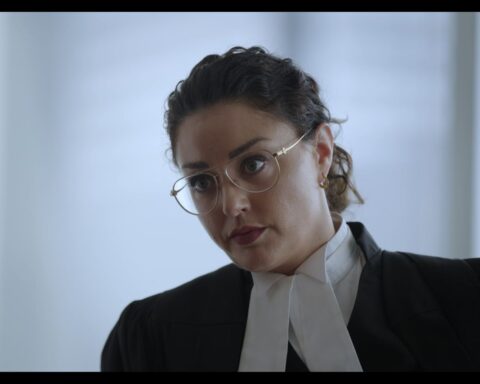Hissein Habré, a Chadian Tragedy
(France/Chad, 82 min.)
Dir. Mahamat-Saleh Haroun
Programme: Masters (North American Premiere)
The running theme of documentaries at this year’s Toronto International Film Festival seems to be “we can’t make the same mistake twice.” Like the title of the latest doc from Canadian master Alanis Obomsawin (read the POV interview with Obomsawin here), the non-fiction films at TIFF 2016 largely unpack traumatic chapters of history with telling parables of the past repeating itself. The dark legacy that Mahamat-Saleh Haroun confronts in Hissein Habré, a Chadian Tragedy is among the grimmest of these tales. The film shows how former Chadian president Hissein Habré was put on trial for crimes against humanity as numerous victims testified to the gross human rights violations, countless beatings, and state sanctioned executions of 40 000 people during his reign from 1982 to 1990. Hissein Habré, a Chadian Tragedy is a compelling example of documentary’s ability to bear witness to the sins of the past.
In the vein of Tiffany Hsiung’s The Apology, which had South Korean “comfort women” fight for an acknowledgement of crimes committed by the Japanese government during World War II, Haroun’s doc invites survivors to tell their stories. The director listens patiently and compassionately as his subjects reveal their physical and emotional scars. They recall the moments in which they were beaten, maimed, or tortured at the command of their former leader. The Chadians display hacked limbs, damaged eyes, and countless scars from acid, machete chops, and unspeakable torture. The sense of horror and catharsis is overwhelming, as Chadians relive their traumatic experiences and try to make sense of their lives in the aftermath of such collective devastation.
Haroun plays a significant role as a compassionate observer while encountering his countrymen from both sides of the tragedy. The director finds a compelling guide in Clément Abaïfouta, a former prisoner and the current leader of the Association of the Victims of the Crimes of the Hissène Habré Regime, who tours the streets and lets his fellow countrymen unburden themselves. One significant episode sees Abaïfouta mediate an encounter between a victim and his aggressor. By inviting an open dialogue and encouraging a guilty party to come face to face with his past crimes, the film sees an unexpected reconciliation.
Unlike the grandmothers of The Apology, though, the citizens of Chad get their trial. The film culminates with an account of Habré’s trial for war crimes, which shows a man who, unlike the aforementioned aggressors, refuses to show remorse as he denies the power of the courts. A final title card notes that Habré was eventually convicted on May 30, 2016. It’s an important fact added after the film’s Cannes premiere earlier that month, so the film serves as a more complete record of what transpired during Habré’s regime. The film puts a human face on the crimes of a world leader and gives the victims a place to hold their assailant accountable for his deeds. Hissein Habré, a Chadian Tragedy is a powerful study of healing and closure.
Please visit tiff.net for more information on this year’s festival.










